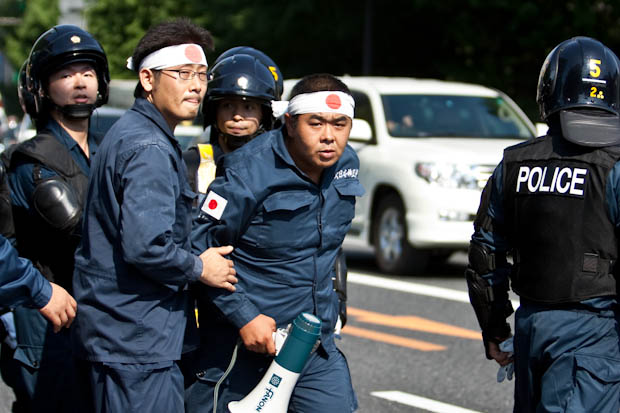August is a time for the celebration of the dead in Japan. Unfortunately it’s also a time for nationalist members of the government to turn the anniversary of the ending of WW2 into a political occasion to serve revisionist notions of history.
In a sensitive piece in The Japan Times, Shaun O’ Dwyer writes of the symbolism behind Yasukuni and the way the nationalist discourse obscures the real gains that Japanese society has made since the war. Here follows an excerpt related to the Shinto aspect.
**************************************
It’s time for conservatives of Japan to get over the war
BY SHAUN O’DWYER SPECIAL TO THE JAPAN TIMES
There is … a conviction [among conservatives] that if Japanese are to rally around their democracy in the face of an increasingly aggressive China and a belligerent North Korea, they must have feelings of pride rather than shame for those who lost their lives in past wars.
The dead servicemen honored at Yasukuni must all be remembered as having sacrificed themselves righteously for their country, including those executed as war criminals.
Naturally, conservative politicians’ revisionism and Yasukuni Shrine visits are infuriating the Chinese and Koreans, and disturbing Japan’s allies. They are also divisive for the Japanese people. Many still cherish Japan’s postwar pacifist values, and regard Yasukuni as the stronghold of a discredited State Shinto cult.
This State Shinto cult is often overlooked in foreign media commentary, but it deserves closer scrutiny. In the 1930s, as militarism took hold, Yasukuni Shrine moved to the center of Japan’s spiritual life, and so did its deadly contract with Japan’s enlisted men.
In return for their unquestioning loyalty to the emperor as the head of this cult, they were promised enshrinement as heroic spirits (eirei) at Yasukuni if they died in action, to be honored by the emperor and the rest of Japan. Yasukuni Shrine still embraces State Shinto, and refuses to accept criticisms of Japan’s wartime conduct that might insult the spirits it enshrines.
The problem for Yasukuni and its allies is a historical burden shared with Germany that irretrievably darkens patriotic truisms about the war dead. They cannot credibly deny that Japan waged an atrocity-laden war of conquest between 1937 and 1945. Many Japanese, and most citizens in nations antagonistic to or even friendly to Japan, see nothing meaningful in the cause that over two million Japanese servicemen died for in the Asia-Pacific war.
So a predictable cycle drags on in which conservative politicians and loose cannons like Osaka Mayor Toru Hashimoto assert their revisionist convictions, suffer international condemnation and then retreat into insincere back-downs or tu quoque bluster.
Their obsession with overcoming shame at Japan’s wartime past also comes at the cost of overlooking what Japanese patriots should be proud of in Japan’s postwar era.

Tension between nationalists and protesters can sometimes spill over into violence. Christian members of a protest group were once badly beaten up while police looked on (photo courtesy ededition, which carries a report on the riots at http://www.ededition.com/yasukuni-shrine-riotsprotests/).


Leave a Reply